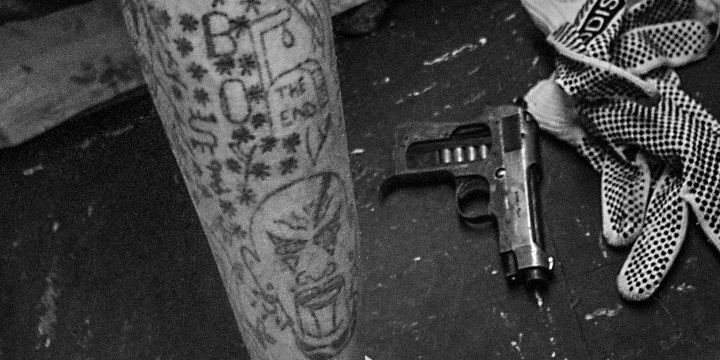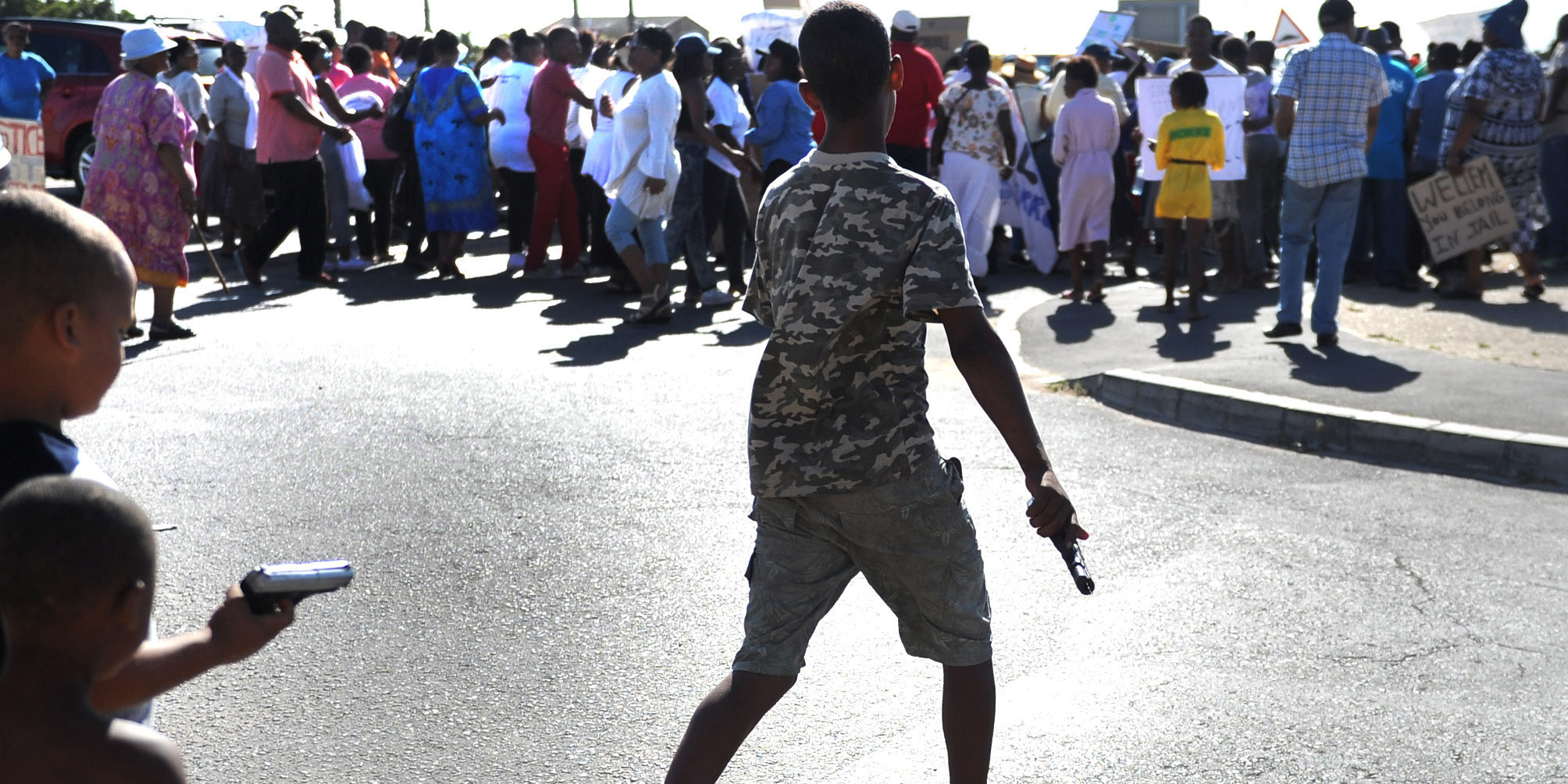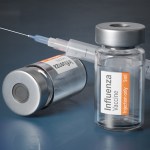CAPE OF GUNS OP-ED
Cape Town communities are at war – what will it take to stop the senseless shootings?

Cape Town’s murder rate is 10 times the global average, with firearms now being the leading cause of murder in the Western Cape, even exceeding road traffic deaths. Mortuary data show that firearm injuries are the primary cause of unnatural deaths in teenagers in the Western Cape.
‘Saturday – they all played games in the street – hide and seek – then, they were walking and dancing and singing. And as they took the turn, they started shooting – gangs – shooting across the street. The first bullet hit her in the front of the head. She was shot through the head and it went out on the right and the second bullet went up her back and out through her neck. I heard her heartbeat in the ambulance as we were driving. But by the time we got there the doctors could do nothing to save her.”
Stacey, aged seven, died in hospital in her mother’s arms, her life cut short by the crossfire in a gang shootout in Bonteheuwel. Sadly, this is not a one-off story for the children of the Cape Flats.
The Red Cross War Memorial Children’s Hospital manages child victims of gunshots almost daily. Unbelievably, Forensic Pathology Service (FPS) mortuary data show that firearm injuries are the primary cause of unnatural deaths in teenagers in the Western Cape – 49% of homicides in the 15-19 age group were firearm related, and this trend has increased by 11% from 2017 to 2022.
Children as young as toddlers, as well as mothers and breadwinners are all direct and indirect victims.
Equally worrying, these data suggest a 68% overall increase in firearm-related femicides since 2017 which points to the presence of guns in our homes, where four out of every 10 murdered women are killed by a gun. Fathers, brothers and sons still bear the disproportionate brunt of firearm violence, injuries and deaths.
Hospitals across the Peninsula, particularly Mitchells Plain and Khayelitsha District Hospitals, see a surge of gunshot wounds every weekend, taking over the emergency centres and often the emergency theatre and all available staff.
‘Red zones’
Ambulance and FPS staff around the metropole constantly put their lives at stake in extracting the wounded and dead from the so-called “red zones” where emergency personnel can only enter with a police escort.
Victims are commonly shot multiple times and thus often need transfer from the nearby district hospitals to the bigger tertiary hospitals for specialist surgery and rehabilitation.
Groote Schuur and Tygerberg Hospitals absorb the injured from the month-end warzone and manage these patients as best they can, although they can overwhelm the theatre, ICU, and orthopaedic services such that routine emergencies and elective surgery are constantly deprioritised.
The aftermath of the weekend is also seen at the Cape Town FPS mortuaries, where half of all men admitted are killed by firearms, and this trend has increased by a third between 2017 and 2022.
Read on Daily Maverick: Bheki Cele in the firing line of critical class action against police over the smuggling of guns to gangsters
While mortuary staff constantly experience a backlog of bodies of victims who didn’t make it to hospital, frequently, the body count increases midweek as gunshot victims who die in hospital are transferred to the local mortuaries.
Single gunshots are now a rarity and entire magazines are typically emptied into victims. What was in the past a straightforward post-mortem now takes days, with as many as 20 bullets in a single victim. Gang members shoot to make absolutely certain death is an outcome.
Cape Town’s murder rate is 10 times the global average, with firearms now being the leading cause of murder in the Western Cape (incidence rate of 30.4 per 100,000 population in 2021), even exceeding road traffic deaths.
In 2019, half of unnatural deaths among children under 18 years were firearm related. The Covid-19 lockdown reduced the total number of homicides and injuries, but the proportion of firearm injuries actually increased, consistent with the SAPS reports of high numbers of illegal firearms and ammunition.
Visit Daily Maverick’s home page for more news, analysis and investigations
Firearm victims (compared to other injuries) are more likely to die en route to hospital, more likely to be admitted and to require advanced and prolonged in-hospital treatment and rehabilitation.
And they cost the healthcare system (and the economy) immensely – largely funded by the taxpayer (rather than those who profit from the trade in guns, ammunition and gang-related activities).
Dealing with injured patients from senseless firearm injuries, along with concern over their own safety at work, has been shown to leave healthcare workers demoralised, uncaring and burnt-out, leading to poor performance, lack of empathy and staff absenteeism.
The current scourge of gun violence cripples our healthcare services, with an imbalance of healthcare time and resources spent on the consequences of firearm injuries.
A good deal of research and evidence has gone into the drivers of firearm violence – inequality, poverty, unemployment, constant exposure to violence and lack of education.

Young children playing with toy guns at a protest outside Manenberg police station, Cape Town in 2015. (Photo: Brenton Geach)
To date much of the public health response has been reactive, improving our capacity and ability to manage the victims of firearm injuries, but we increasingly recognise that this is not enough.
Current research should focus on investigating various aspects of firearm violence prevention – structural and social drivers, law enforcement, military support and gun control, as well as addressing gang issues and the root causes of violence (discriminatory policies and practices, and inequities in social determinants like poverty, inadequate housing, food insecurity, etc).
The launch of the Violence Prevention Unit, to be housed within the Department of Health and Wellness in the Western Cape, will facilitate the use of safety dashboard data, which includes Emergency Medical Services, acute emergency and FPS data to identify gunshot hot zones, and deployment of evidence-led interventions, such as the deployment of additional law enforcement agencies such as Law Enforcement Advancement Plan (LEAP) officers and area-based teams in the red zones.
This multistakeholder collaboration between health, government and community-based organisations is necessary for reducing the negative impact of gun violence on communities and healthcare provision in this wealthiest and best-resourced province in South Africa.
Firearm injuries are a public healthcare epidemic and we need concerted, systemwide efforts to stem the tide of senseless death and injury. DM
The authors, who are all members of the Trauma Advocacy Group (TAG), University of Cape Town, acknowledge the various data sources cited, some as yet unpublished, including those from the Forensic Pathology Services, and the Western Cape Department of Health and Wellness.
Associate Professor Peter Hodkinson: Emergency Medicine, UCT; Dr Itumeleng Molefe: Forensic Medicine and Toxicology, UCT; Professor Pradeep Navsaria: Trauma Surgery UCT; Professor Sithombo Maqungo: Orthopaedic Surgery, Groote Schuur Hospital and UCT; Ms Lea A Marineau: School of Nursing, Johns Hopkins University, Baltimore, USA; Dr Megan Prinsloo: Burden of Disease Research Unit, SA Medical Research Council, UCT and University of Greenwich, UK; and Professor Richard Matzopoulos: Burden of Disease Research Unit, SA Medical Research Council and UCT.



















I would put money on guns being funnelled into these areas as a purely political move from opponents who want to see the DA fail.
I would also put money on the same people not wanting to devolve SAPS to the provinces because then the DA might actually be able to have a greater impact.
For now we can only pray LEAPS, Metro cops, and private security can somehow slow this scourge down, because without successful prosecutions (which is also another thing that the DA’s political opponents don’t seem to be in a rush to fix), these guys get arrested and just end up back on their home turf with new guns from their gun dealing friends.